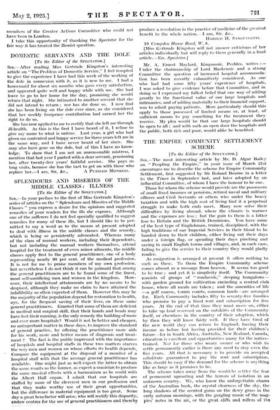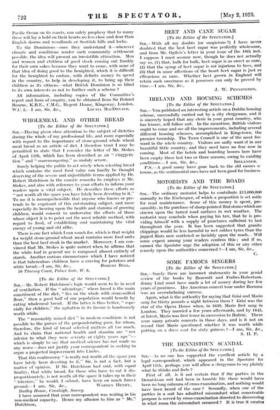THE EMPIRE COMMUNITY SETTLEMENT SCHEME
[To the Editor of the SPECTATOR.] Sin,—The most interesting article by Mr. D. Algar Bailey on " Peopling the Empire," in your issue of March 21st encourages me to describe the scheme for Empire Community Settlement, first suggested by Sir Roland Bourne in a letter to the Times in September last, and later adopted by an influential Committee, of whom I have the honour to be one.
Those for whom the scheme would provide are the possessors of small fixed incomes or pensions, retired naval and military officers and Civil Servants or others who under the heavy taxation and with the high cost of living find it a perpetual struggle to make both ends meet. Many now solve their difficulties by living abroad, where the climate is warmer and the expenses are less ; but the gain to them is a bitter loss to Britain and the British Dominions. You have some of the best type of Englishman, trained, disciplined, with the high traditions of our Imperial Services in their blood to be handed down to their children, either living out their days under a foreign flag, or spending their days pinching and saving in small English towns and villages, and, in each case, failing to give the service to their country they would gladly render.
As emigration is arranged at present it offers nothing to such as these. To them the Empire Community scheme comes almost as a message from heaven. It seems too good to be true ; and yet it is simplicity itself. The Community consists of groups of " rondavels," sleeping bungalows— with garden ground for cultivation encircling a central club house, where all meals are taken ; and the amenities of life --a golf course, tennis courts, common lands—arc arranged for. Each Community includes fifty to seventy-five families who promise to pay a fixed rent and subscription for five years. At the end of that time they must move on, either to take up land reserved on the outskirts of the Community itself, or elsewhere in the country of their adoption, which by then they will know fairly well. If they have tired of the new world they can return to England, having their income as before but having provided for their children's future—for in South Africa, Australia, New Zealand, Canada, education is excellent and opportunities many for the native- trained. Nor for those who weary sooner or who wish to settle permanently earlier is there any need to stay even the five years. All that is necessary is to provide an accepted substitute guaranteed to pay the rent and subscription. This should be easy if the demand for the scheme is anything like as large as it promises to be.
The scheme takes away from the would-be settler the fear of permanent uprooting and the terrors of isolation in an unknown country. We, who know the unforgettable charm of the Australian bush, the crystal clearness of the sky, the long shadows of the scented gums on the dewy grass in the early autumn mornings, with the gurgling music of the mag- pies' notes in the air, or the great cliffs and rollers of the Pacific Ocean on its coasts, can safely prophesy that to many these will lay a hold on their hearts no less close and dear than English downs and woodlands or Scottish bills and lochs.
To the Dominions—once they understand it--wherever climate and conditions render such community settlement possible, the idea will present an irresistible attraction. Men and women and children of good stock coming out frankly for their own sakes because they want to come, with none of that idea of doing good to the benighted, which it is difficult for the benighted to endure, with definite money to spend in the country, to help in developing it, to bring up their children as its citizens—what British Dominion is so blind to its own interests as not to further such a scheme ?
All information, including copies of the Committee's report and form of enquiry, can be obtained from Sir Roland Bourne, K.B.E., C.M.G., Regent House, Kingsway, London,











































 Previous page
Previous page